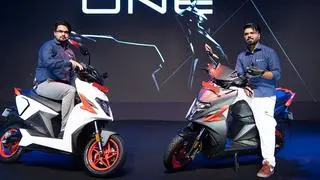
The quota for imports of UK electric vehicles at concessional tariff rates is limited to “thousands” only
Under the Free Trade Agreement (FTA) with the UK, India will not make mandatory concessions to British companies on many sensitive industrial products such as diamonds, silver, smartphones and optical fibers, officials said.
Officials also said mandatory concessions regarding the importation of gasoline and diesel engine vehicles from the UK are limited to predefined quotas.
Similarly, the quota for imports of UK electric vehicles (EVs) at concessional tariff rates is limited to only “thousands.”
Sensitive industrial products such as plastic, diamond, silver, base stations, smartphones, TV camera tubes, optical fibers, fiber optic bundles, cables and more are stored under the exclusion list of FTAs.
Import duties are not provided for these goods from India to the UK.
Opening the automotive sector, officials said that as the global fourth largest auto producer, India has the size and strategic depth to emerge as a global leader in the automotive value chain.
Despite India’s strong manufacturing hub, its share in the globally traded automobile market remains curtailed, highlighting the vast extent of expansion.
Access to the UK market for ice (internal combustion engine) vehicles could boost the country’s exports of automobiles and automotive components.
“There is no reduction in EV quota tax. EV-related sensitivity is being taken care of. Ice vehicle quota tax will be gradually reduced over the long term, which will help the industry absorb the rise in imports from the UK,” the official added.
India and the UK on Tuesday sealed off a groundbreaking free trade agreement that lowers tariffs on Indian exports of 99%, making it easier for British companies to export whiskey, cars and other products to India, along with increasing the entire trade basket. The aim is to double two-way commerce from the current $60 billion by 2030.
Tariffs on automobile imports will go from over 100% under the allocation on both sides to 10%, which will benefit companies such as TATA-JLR.
According to the latest data released by the Automobile Dealer Association (FADA), retail sales of electric passenger car in India rose 56.87% in April this year compared to 7,798 units in the same month last year.
Tata Motors continued to lead the market with 4,436 units of electric PV sold last month, but JSW MG Motor India and Mahindra & Mahindra (M&M) are catching up with 3,462 and 2,979 units, respectively, for each FADA data matched on May 2.
India’s total passenger car imports from the UK were only $2.75 million or 60 units in 2024.
Most automobile manufacturing units in the UK manufacture premium brands with premiums such as Bentley, BMW, Rolls-Royce and Aston Martin.
Saurabh Agarwal, Partner & Auto Tax Leader at Ey India, said, “This transaction should really help auto component manufacturers sell more in the UK. At the same time, Indian consumers probably won’t shake up Indian cars as Indian consumers prefer more affordable prices, so perhaps Indian consumers can buy premium cars at a reasonable price.
Furthermore, under the FTA, India has taken a longer period to phase out the duties of many items such as ceramics, petroleum products, carbon, red phosphorus, sulfuric acid, sulfuric acid, boric acid, and chemicals such as aircraft engines.
From 2023-24, India’s goods exports to the UK were $129.2 billion, while imports were $8.41 billion. The trade gap is favorable for India.
Something like this


Released on May 7, 2025







